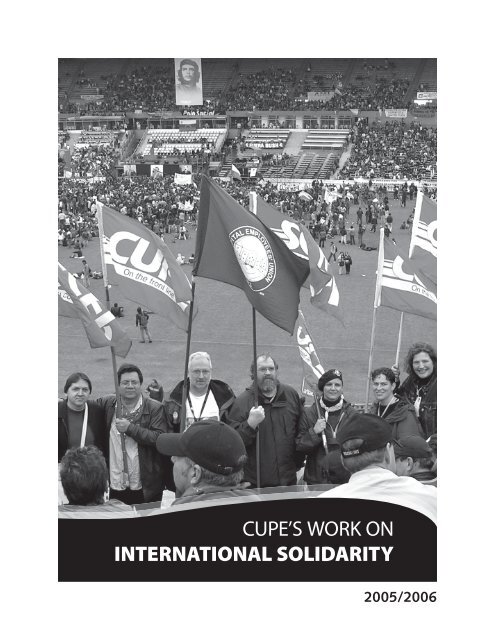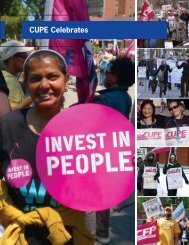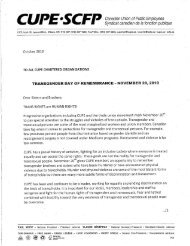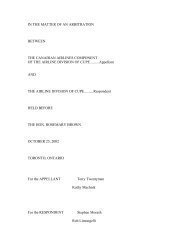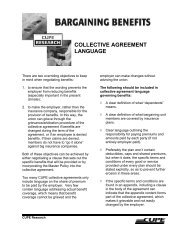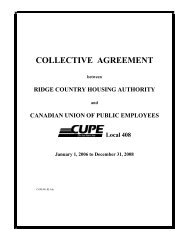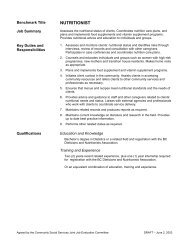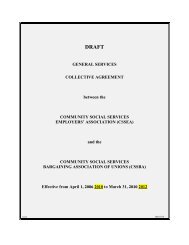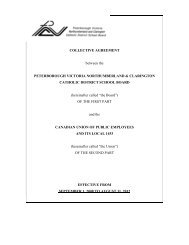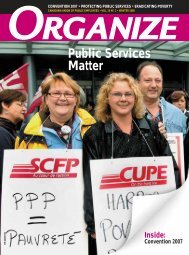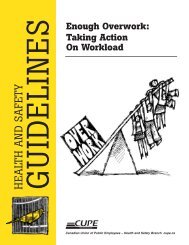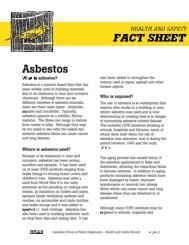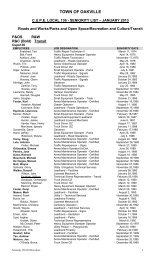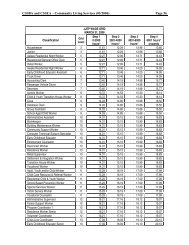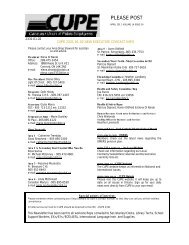International Solidarity Report - Canadian Union of Public Employees
International Solidarity Report - Canadian Union of Public Employees
International Solidarity Report - Canadian Union of Public Employees
Create successful ePaper yourself
Turn your PDF publications into a flip-book with our unique Google optimized e-Paper software.
CUPE’S WORK ON<br />
INTERNATIONAL SOLIDARITY<br />
2005/2006
Cover: CUPE delegation at the People’s Summit <strong>of</strong> the Americas, Mar Del Plata,<br />
Argentina, November 2005.
CUPE’S WORK ON<br />
INTERNATIONAL SOLIDARITY<br />
CUPE has a long and proud history <strong>of</strong> international solidarity work guided by<br />
convention policy. In 2001 we adopted “On the front line locally and globally”. In<br />
2003, our strategic directions policy integrated international campaigns and strategic<br />
alliances as a core element <strong>of</strong> our work.<br />
In 2005, our national convention adopted a new strategic directions policy that,<br />
among other priorities, focuses on sectoral organizing. In this vein, the convention<br />
also supported the health care workers exchange that CUPE initiated in 2003 to<br />
create and strengthen the network among health care workers <strong>of</strong> the Americas.<br />
CUPE’s international work takes many forms and has grown significantly in<br />
recent years. Some <strong>of</strong> this work occurs through our affiliations and some through<br />
our global justice fund. We have also forged ties to other unions and some CUPE<br />
members work in international affairs as part <strong>of</strong> their jobs.<br />
This report summarizes our international solidarity work to help inform our union<br />
and to continue to use our resources in the most effective way possible.<br />
Affiliations<br />
<strong>Canadian</strong> Labour Congress (CLC)<br />
CUPE is the largest affiliate union <strong>of</strong> the 3 million-member CLC. In 2005, our<br />
annual affiliation dues to the CLC were $3.7 million. The CLC’s international department<br />
does extensive international work on a variety <strong>of</strong> fronts on behalf <strong>of</strong> affiliates,<br />
and coordinates projects all over the world.<br />
In addition to coordination, policy and advocacy work with the <strong>Canadian</strong> government,<br />
the CLC has a five-year funding agreement with the <strong>Canadian</strong> <strong>International</strong><br />
Development Agency (CIDA). CUPE is a partner in this agreement. CUPE<br />
also participates in the labour international development committee and in a number<br />
<strong>of</strong> other CLC campaigns, such as the “No Sweat” committee. The CLC website at<br />
www.clc-ctc.ca provides a detailed summary <strong>of</strong> its international work.<br />
CUPE regularly pr<strong>of</strong>iles international statements such as the May 2006 CLC<br />
Executive Council case for Canada to remove troops from Afghanistan and to support<br />
peace keeping efforts in Darfur.<br />
C A N A D I A N U N I O N O F P U B L I C E M P L O Y E E S<br />
1
CUPE members and others rally for cancellation <strong>of</strong> Third World debt<br />
Mehdi Kouhestaninejad <strong>of</strong> CUPE 3261, former president <strong>of</strong> CUPE Toronto district<br />
council and a long time activist in international solidarity issues, is now working in<br />
the international department <strong>of</strong> the CLC.<br />
<strong>International</strong> Confederation <strong>of</strong> Free Trade <strong>Union</strong>s (ICFTU)<br />
Through the CLC, we are affiliated with the <strong>International</strong> Confederation <strong>of</strong> Free<br />
Trade <strong>Union</strong>s (ICFTU), representing 148 million workers in 233 affiliated organizations<br />
in 153 countries. The upcoming ICFTU congress in November 2006 in Vienna,<br />
Austria will see the ICFTU merge with the 10 million members <strong>of</strong> the World Confederation<br />
<strong>of</strong> Labour, creating a new Trade <strong>Union</strong> <strong>International</strong>. CUPE has been a<br />
member <strong>of</strong> the ICFTU, through the CLC, since the inception <strong>of</strong> the CLC in 1956.<br />
Through the CLC we are also members <strong>of</strong> the ICFTU regional coordinating body,<br />
Inter-American Regional Organization <strong>of</strong> Workers (ORIT). ORIT’s objectives are to promote<br />
democratic unions and political, social and economic democracy in the Americas<br />
(www.icftu.org).<br />
CUPE is represented by the CLC at the <strong>International</strong> Labour Organization (ILO),<br />
a United Nations agency seeking the promotion <strong>of</strong> social justice and internationally<br />
recognized human and labour rights (www.ilo.org).<br />
<strong>Public</strong> Services <strong>International</strong> (PSI)<br />
CUPE is an affiliate <strong>of</strong> <strong>Public</strong> Services <strong>International</strong>. Membership cost $148,489<br />
in 2005. PSI is the global federation <strong>of</strong> public sector unions and advocates on<br />
behalf <strong>of</strong> public sector workers throughout the world. It represents over 650 trade<br />
unions in 150 countries with more than 20 million members (www.world-psi.org).<br />
2<br />
C U P E ’ S W O R K O N I N T E R N AT I O N A L S O L I D A R I T Y • 2 0 0 6
The following CUPE members and staff serve on PSI bodies:<br />
• Paul Moist, member, public sector working group<br />
• Donalda MacDonald, alternate member <strong>of</strong> the inter-Americas region<br />
women’s committee and <strong>of</strong> the world women’s committee<br />
• Kathy Corrigan, member, health services task force<br />
In March 2006, CUPE, along with the <strong>Public</strong> Service Alliance <strong>of</strong> Canada, the<br />
National <strong>Union</strong> <strong>of</strong> <strong>Public</strong> and General <strong>Employees</strong>, the Service <strong>Employees</strong>’ <strong>International</strong><br />
<strong>Union</strong>, the Centrale des syndicats du Québec, the Syndicat des pr<strong>of</strong>essionnelle-s<br />
du gouvernement du Québec, the Syndicat de la fonction publique du Québec<br />
and the Fédération des infirmières et infirmiers du Québec, organized and funded a<br />
successful PSI conference in Ottawa on new forms <strong>of</strong> privatization. Participants from<br />
Belize, Norway, South Africa, the United Kingdom and the United States shared<br />
experiences and strategies about privatization struggles and identified ways to work<br />
together effectively.<br />
CUPE was represented by National President Paul Moist, National Secretary-<br />
Treasurer Claude Généreux, and regional vice-presidents Donalda MacDonald,<br />
Candace Rennick, Donna Ryan, and D’Arcy Lanovaz. CUPE staff also attended and<br />
participated as organizers, facilitators and presenters. Roseanne Moran, a CUPE<br />
communications representative in British Columbia, presented a case study <strong>of</strong> the<br />
successful Vancouver Island Water Watch campaign on a conference panel.<br />
CUPE has been following the outcomes <strong>of</strong> a research initiative coordinated by PSI<br />
on the issues <strong>of</strong> migrant women health care workers. This study engages PSI affiliated<br />
unions in 15 participating countries around the world to campaign for improved<br />
funding for health services and to protect migrant workers’ rights. Canada has been<br />
represented on the project by the British Columbia Government <strong>Employees</strong>’ <strong>Union</strong>.<br />
The next PSI World Congress will be in Vienna, Austria, Sept. 24-28, 2007.<br />
CUPE members are part <strong>of</strong> the World March <strong>of</strong> Women<br />
C A N A D I A N U N I O N O F P U B L I C E M P L O Y E E S<br />
3
CUPE national executive board (NEB)<br />
CUPE’s NEB is charged with oversight on a range <strong>of</strong> international matters. The<br />
national executive committee (NEC) is the governing body for the global justice<br />
fund. The <strong>of</strong>fice <strong>of</strong> the national president directs international matters in conjunction<br />
with appropriate CUPE departments.<br />
Not a week goes by where there is not some letter, petition or other urgent<br />
action on international affairs or international human rights. For example, we have<br />
sent several letters to the president <strong>of</strong> Colombia, Álvaro Uribe Vélez, and to the<br />
<strong>Canadian</strong> government to denounce political massacres and repression in Colombia.<br />
We sent messages to the People’s Republic <strong>of</strong> China to express our deep concern<br />
about repression <strong>of</strong> protestors at the World Trade Organization (WTO) meetings in<br />
Hong Kong in December 2005, and we sent letters <strong>of</strong> solidarity to WTO political<br />
hunger strikers trying to draw attention to the unjust actions <strong>of</strong> the Hong Kong<br />
government during the WTO ministerial conference.<br />
We sent messages <strong>of</strong> solidarity to allies in the Philippines and to the government<br />
<strong>of</strong> the Philippines following the unilateral imposition <strong>of</strong> martial law and repression<br />
<strong>of</strong> activists in early 2006. We wrote to the minister <strong>of</strong> justice and attorney general<br />
<strong>of</strong> Canada to express our concern and support for CUPE member Gary Freeman<br />
(Toronto libraries) fighting extradition orders by the U.S. over an incident that took<br />
place more than 35 years ago.<br />
We stand in solidarity with our sisters and brothers in the Congress <strong>of</strong> South<br />
African Trade <strong>Union</strong>s (COSATU) in their struggles against neo-liberal policies being<br />
promoted at the WTO. We sent a message <strong>of</strong> solidarity to the general secretary <strong>of</strong><br />
COSATU and voiced our concerns about COSATU’s issues in a letter to Canada’s<br />
Minister <strong>of</strong> <strong>International</strong> Trade, David Emerson.<br />
CUPE provincial and service divisions<br />
There is a rich history <strong>of</strong> CUPE divisions’ involvement in international work. The<br />
following divisions have international solidarity/global justice committees:<br />
CUPE BC’s international solidarity committee works to raise awareness with<br />
members on international issues and the common interests <strong>of</strong> workers around<br />
the world. The committee is involved in international projects in Cuba, Colombia,<br />
and Central America through the B.C. development organization CoDevelopment<br />
Canada.<br />
4<br />
C U P E ’ S W O R K O N I N T E R N AT I O N A L S O L I D A R I T Y • 2 0 0 6
The CUPE BC international solidarity committee has developed The Wall Must<br />
Fall, an educational resource to help trade unionists and the public understand<br />
the issues and options facing the Palestine/Israel conflict. CUPE is distributing this<br />
educational resource among members, labour affiliates and community activists.<br />
At its 2005 convention, CUPE BC established the Colleen Jordan humanitarian<br />
fund to support its international work with dedicated per capita funding from the<br />
CUPE BC membership.<br />
With funding from the global justice fund, the CUPE BC international solidarity<br />
committee is sponsoring a project to provide human and labour rights training<br />
to members <strong>of</strong> SINTRAEMCALI, the public workers’ union in Cali, Colombia’s<br />
second largest city. Other long-standing projects support women factory workers<br />
(maquiladoras) in Central America and public sector workers in Cuba.<br />
CUPE BC and CoDevelopment Canada coordinated a visit by Carlos Gonzalez,<br />
president <strong>of</strong> SINTRAUNICOL, Colombia’s university workers’ union, to the B.C.<br />
division convention.<br />
The Hospital <strong>Employees</strong>’ <strong>Union</strong> global justice committee, also in B.C., is<br />
another long-standing member <strong>of</strong> CoDevelopment Canada with ongoing project<br />
partnerships in Central America in support <strong>of</strong> maquiladoras. HEU has also<br />
contributed and participated in the health care workers exchange, in partnership<br />
with the global justice fund. HEU leaders and members are activists on international<br />
issues and key organizers <strong>of</strong> international solidarity support campaigns in their<br />
communities.<br />
CUPE Alberta has a standing global justice committee that provides educational<br />
leadership and mobilizes members. The Alberta committee has focused on the<br />
issues facing migrant workers in Canada.<br />
The CUPE Saskatchewan global justice committee raises awareness among<br />
membership about international issues and our common ground with workers in<br />
other parts <strong>of</strong> the world. The committee implements CUPE National’s policies and<br />
programs on international solidarity, coordinates exchanges <strong>of</strong> labour activists,<br />
participates with other unions and organizations on campaigns about globalization<br />
and international trade agreements.<br />
The CUPE Manitoba global justice committee works on issues <strong>of</strong> union<br />
solidarity linking the struggles <strong>of</strong> CUPE Manitoba workers with struggles elsewhere<br />
in the world. The focus is on labour and solidarity issues in developing nations.<br />
The committee worked with other community organizations to host a fundraiser<br />
in 2005 that featured guest speaker Stephen Lewis. This event was co-sponsored<br />
by the Mennonite Central Committee, the Ugandan Society <strong>of</strong> Manitoba and<br />
St. Bartholomew’s Anglican church and raised $87,582. Half <strong>of</strong> this money is<br />
C A N A D I A N U N I O N O F P U B L I C E M P L O Y E E S<br />
5
Ed Thomas (CUPE 5167) visited the United Nations headquarters in New York<br />
to push for recognition <strong>of</strong> April 28, the Day <strong>of</strong> Mourning<br />
designated for work with children in Northern Uganda affected by war and HIV-<br />
AIDS. The committee also participated in CUPE Manitoba’s contracting out and<br />
privatization conference in 2005 to link and integrate international campaigns<br />
against privatization with local struggles.<br />
CUPE Ontario’s international solidarity committee was set up in recognition<br />
<strong>of</strong> the global nature <strong>of</strong> the struggle for workers’ rights. With a global capitalist<br />
economy, challenging the power <strong>of</strong> a single government becomes more and more<br />
difficult. With that in mind, the committee supports efforts to link CUPE members<br />
to activism happening throughout the world. It educates members on situations<br />
faced by workers in other countries by bringing representatives <strong>of</strong> other unions to<br />
Ontario. It also acts as a forum to share information about the connections between<br />
our lives and the work <strong>of</strong> others abroad.<br />
In 2005, the Ontario IS committee initiated a new coalition <strong>of</strong> trade unionists<br />
and community activists to strengthen solidarity work in their communities.<br />
CUPE Ontario has integrated global justice issues at many <strong>of</strong> their conferences.<br />
Division conventions in 2005 and 2006 hosted plenary panels on international<br />
issues with guest speakers from around the world. Division sectoral conferences<br />
integrate international analysis and campaigns, for example, the 2005 social services<br />
conference on globalization and privatization.<br />
The Ontario division has contributed financially to and participated in the health<br />
care workers exchange project.<br />
6<br />
C U P E ’ S W O R K O N I N T E R N AT I O N A L S O L I D A R I T Y • 2 0 0 6
CUPE Quebec participates in international work through the Fédération des<br />
travailleurs et travailleuses du Québec’s international affairs department. CUPE<br />
Quebec and a number <strong>of</strong> its locals have projects and relationships with unions<br />
around the world, such as one between hydro workers in Quebec and France.<br />
CUPE Prince Edward Island division has a standing international solidarity<br />
committee. The P.E.I. committee joined with other CUPE committees from Nova<br />
Scotia, Newfoundland/Labrador and New Brunswick to host (with community<br />
organizations such as Development and Peace) a tour <strong>of</strong> union leaders from<br />
FENSUAGRO, Colombia’s agricultural workers’ union, to the four provinces.<br />
CUPE divisions in Nova Scotia, New Brunswick and Newfoundland/Labrador<br />
have no standing committees, but are working to create them.<br />
CUPE’s airline division is affiliated with the <strong>International</strong> Transport Workers’<br />
Federation (ITF) representing 624 unions with 4.5 million workers in 142 countries.<br />
The ITF is allied with the <strong>International</strong> Confederation <strong>of</strong> Free Trade <strong>Union</strong>s<br />
(www.itfglobal.org).<br />
Our participation in ITF allows us to make representations at the UN’s<br />
<strong>International</strong> Civil Aviation Organization (ICAO) on transportation related matters<br />
(www.icao.int). Through the ITF, <strong>Canadian</strong> flight attendants are working with<br />
AMICUS, the union representing flight attendants at Air New Zealand, British<br />
Airways, Virgin Atlantic, EasyJet, Monarch and British Midland. The airline division<br />
also belongs to the North American Coalition <strong>of</strong> Flight Attendants, which lobbies for<br />
safe working conditions.<br />
CUPE locals and labour councils<br />
Many CUPE locals maintain their own international links, <strong>of</strong>ten associated with<br />
their occupations. For example, Quebec hydro locals cultivate relationships with<br />
electricity unions in France. Many <strong>of</strong> our municipal locals participate in water-related<br />
international activities, while our port workers are affiliated with the ITF.<br />
As members <strong>of</strong> CLC provincial labour councils <strong>of</strong> all affiliated unions, CUPE<br />
divisions and area councils across the country participate in local solidarity activities<br />
and host international delegations.<br />
CUPE BC, as a member <strong>of</strong> the Vancouver and District Labour Council, is<br />
organizing for the Labour Forum at the World Peace Forum in Vancouver in July<br />
2006.<br />
C A N A D I A N U N I O N O F P U B L I C E M P L O Y E E S<br />
7
CUPE Ontario, as a member <strong>of</strong> the Toronto and District Labour Council, hosts<br />
international delegations and organizes events and campaigns on international<br />
issues.<br />
Many CUPE locals and activists have participated in successful local campaigns<br />
to have their city adopt “No Sweat” policies to ensure ethical procurement policy.<br />
CUPE members at international agencies<br />
Many <strong>of</strong> our members work directly for international agencies providing support<br />
and services on an international level. They are amongst our most committed<br />
international activists.<br />
Oxfam (www.oxfam.ca) – Founded in 1963, Oxfam Canada is a non-pr<strong>of</strong>it<br />
international development organization that supports community programs in<br />
food security, health, nutrition and democratic development with an emphasis on<br />
working with women. (CUPE 2722)<br />
CUSO (www.cuso.org) – CUSO is a <strong>Canadian</strong>-based international development<br />
organization working with partner groups and individuals to foster equality and<br />
freedom, safeguard cultures and communities, and protect the environment.<br />
(CUPE 2440)<br />
KAIROS (www.kairoscanada.org) – As the coordinating body <strong>of</strong> <strong>Canadian</strong><br />
churches, KAIROS works on international issues such as debt, energy, water, HIV-<br />
AIDS, human rights, trade and poverty. (CUPE 4557)<br />
CoDevelopment Canada (www.CoDevelopment.org) – This 26-year old<br />
organization works to form partnerships between groups in B.C. and in Latin<br />
America to build alliances for social change. The partnerships involve unions<br />
(including CUPE), community groups, women’s organizations and unions in Latin<br />
America and Cuba. This model has strengthened affiliates’ international work<br />
through project delivery and educational work among members. (CUPE 1004-13)<br />
<strong>Canadian</strong> Council for <strong>International</strong> Cooperation (CCIC) (www.ccic.ca) – The<br />
council is a coalition <strong>of</strong> <strong>Canadian</strong> voluntary sector organizations working globally<br />
to achieve sustainable human development. The CCIC seeks to end global poverty<br />
and to promote social justice and human dignity for all. It has co-chaired the “Make<br />
Poverty History” campaign. CUPE has supported this campaign directly and with<br />
financial support and through actions coordinated by the CLC. (CUPE 3371)<br />
8<br />
C U P E ’ S W O R K O N I N T E R N AT I O N A L S O L I D A R I T Y • 2 0 0 6
CUPE bilateral relationships<br />
Our union has a history <strong>of</strong> strong bilateral relations with unions throughout the<br />
world, including:<br />
• South African Municipal Workers’ <strong>Union</strong><br />
(www.samwu.org.za)<br />
• National Health Education and Allied<br />
Workers <strong>Union</strong> in South Africa<br />
(www.nehawu.org.za)<br />
• UNISON, representing public service<br />
workers across the U.K.<br />
(www.unison.org.uk)<br />
• <strong>Union</strong> <strong>of</strong> State Workers (ATE) in<br />
Argentina: www.ateargentina.org.ar<br />
• SINTRAUNICOL, the Colombian<br />
university workers’ union<br />
(www.sintraunicol.univalle.edu.co)<br />
• The Municipal Workers <strong>Union</strong> <strong>of</strong> EMCALI<br />
(SINTRAEMCALI) in Cali, Colombia<br />
• Longstanding relationships with the Cuba<br />
Trade <strong>Union</strong> Central<br />
SAMWU vice-president<br />
Xolile Nxu at CUPE’s<br />
national convention<br />
CUPE’s global justice fund and committee<br />
CUPE’s global justice fund (formerly known as the union aid fund) was<br />
established in 1993. Its primary sources <strong>of</strong> revenue are from CUPE National, the<br />
CLC, CIDA, CUPE locals, members and staff. The fund has annual revenues <strong>of</strong><br />
about $100,000. It is vital that CUPE locals contribute to the fund in order to make<br />
it more effective. All contributions are welcome. For example, CUPE 2440 at CUSO<br />
recently held an event that raised $335 for the fund.<br />
The national global justice committee recommends the funding <strong>of</strong> projects<br />
to CUPE’s national executive committee (NEC) according to approved criteria<br />
and strategic goals as established by 2001 convention policy. The global justice<br />
committee follows an approved strategic work plan and has terms <strong>of</strong> reference<br />
approved by the national executive board.<br />
C A N A D I A N U N I O N O F P U B L I C E M P L O Y E E S<br />
9
Projects funded by the global justice fund in the past year include:<br />
• Cuba: The third health care workers’ exchange, Havana, May 2006. With<br />
support and participation from Hospital <strong>Employees</strong> <strong>Union</strong>, the Ontario<br />
Council <strong>of</strong> Hospital <strong>Union</strong>s, the Ontario Division, <strong>Canadian</strong> Auto Workers<br />
and the Ontario Federation <strong>of</strong> Labour. The exchange has grown from the<br />
inaugural event hosted by CUPE in 2003 in Canada and now includes union<br />
representatives from 23 countries in South, Central and North America and<br />
the Caribbean. PSI supports and participates in this initiative.<br />
• Guatemala: “Radio Libertad,” with the Peten Alliance for Life and<br />
Peace, sponsored by CUPE 1281 has launched a community radio and<br />
communications strategy in the remote Peten region, which is largely<br />
inhabited by indigenous groups. Believing that “information is power,” the<br />
project provides alternative voices to corporate media to strengthen the<br />
struggle to build a democratic and just society.<br />
• Cuba: Strengthening solidarity with Cuban public sector unions and<br />
CUPE, with SNTAP – the National <strong>Union</strong> <strong>of</strong> <strong>Public</strong> Sector Workers <strong>of</strong><br />
Cuba, sponsored by CUPE BC. The example set by Cuba continues to be<br />
an important one for workers worldwide. CUPE BC has partnered with<br />
SNTAP for many years to build solidarity links between Cuba and Canada,<br />
in particular in the trade union movement. This project supports training in<br />
pr<strong>of</strong>essional development and union responsibilities for the SNTAP Havana<br />
branch and its members. CUPE BC and CoDevelopment Canada, work<br />
together to raise awareness <strong>of</strong> Cuba and its public sector workers in Canada.<br />
• Colombia/Canada tour: Two front line tours <strong>of</strong> Colombia for public sector<br />
workers from CUPE, the <strong>Public</strong> Service Alliance <strong>of</strong> Canada and the <strong>Canadian</strong><br />
<strong>Union</strong> <strong>of</strong> Postal Workers. The tours are planned for late summer and early<br />
fall 2006. Following the successful <strong>Canadian</strong> tour <strong>of</strong> five Colombia trade<br />
union and community activists, hosted by the three national unions and<br />
the CLC, these educational tours will allow <strong>Canadian</strong> participants to meet<br />
with their sister unions and organizations in Colombia. The goal is to build<br />
and strengthen solidarity links between Colombian and <strong>Canadian</strong> public<br />
sector workers and to explore practical and project work that will bolster<br />
our anti-privatization fight. Colombia is one <strong>of</strong> the world’s most dangerous<br />
places for trade unionists. Since 1989, it has been reported that more than<br />
10<br />
C U P E ’ S W O R K O N I N T E R N AT I O N A L S O L I D A R I T Y • 2 0 0 6
CUPE 401 president Rodger Oakley (left), Santiago Araconada Rodriguez, a<br />
representative <strong>of</strong> the Venezuelan public water company, and Saskatchewan<br />
NEB vice-president Frank Mentes at the World Water Forum in Mexico City<br />
3,000 unionists have been assassinated there. One <strong>of</strong> the main challenges<br />
confronting public sector unions in Colombia is privatization. Colombian<br />
unions are fighting to resist losing public control over public services – the<br />
same fight in which CUPE and other <strong>Canadian</strong> public sector unions are<br />
engaged. These tours will deepen our understanding <strong>of</strong> how to organize with<br />
the local community and will build support for anti-privatization struggles.<br />
• Colombia: A human rights training school for Colombian public sector<br />
workers, a partnership with SINTRAEMCALI/NOMADESC in Cali, sponsored<br />
by CUPE BC. This project links the struggles against privatization in Canada<br />
with our sister union in Cali. This is the third year <strong>of</strong> support for the training<br />
school, which helps members to understand and defend their human rights<br />
and those <strong>of</strong> their communities. It also trains new leaders, which in turn<br />
strengthens the union and the community. In turn, CUPE BC and the project<br />
coordinator, CoDevelopment Canada, are building a base <strong>of</strong> awareness<br />
among CUPE members <strong>of</strong> the labour rights situation in Colombia and the<br />
importance <strong>of</strong> anti-privatization resistance there and here. CUPE BC hosted a<br />
NOMADESC representative at its April 2006 convention.<br />
C A N A D I A N U N I O N O F P U B L I C E M P L O Y E E S<br />
11
• Nicaragua: An ongoing project to empower women maquila workers, with<br />
an emphasis on capacity building and training for mediation, negotiation<br />
and conflict resolution. In partnership with the Maria Elena Cuadra (MEC)<br />
Women’s Movement/Centre, sponsored by CUPE BC and in cooperation<br />
with CUPE members who work with CoDevelopment Canada, this long-term<br />
partnership project works with women maquila workers in the free-trade<br />
zones to defend their rights. The centre’s mobile law firm assisted over 2,000<br />
maquila workers facing problems. Educational and communication materials<br />
train women leaders in mediation and negotiation skills. MEC’s Ninth<br />
National Forum for Maquila Workers will take place in March 2007. More<br />
than 1,200 women workers are expected to participate.<br />
• Honduras: An ongoing project to empower women maquila workers<br />
in occupational health and safety. This is sponsored by HEU/CUPE in<br />
partnership with the Honduran Women’s Collective CODEMUH. Over 85 per<br />
cent <strong>of</strong> HEU members are women and they are under the same global attack<br />
on their rights as workers throughout the world. HEU and CUPE National are<br />
working towards global partnerships that will strengthen our ability to win<br />
on a global scale. This project trains women maquila workers so they can<br />
defend their rights and participate in international campaigns and research.<br />
HEU, with the coordination <strong>of</strong> CUPE members at CoDevelopment Canada,<br />
is committed to ongoing solidarity partnerships and raising the awareness <strong>of</strong><br />
<strong>Canadian</strong> workers regarding the situation <strong>of</strong> women in Honduras, especially<br />
in the free trade zones.<br />
• Central America: An ongoing project to help women maquila workers with<br />
the Central American Women’s Network sponsored by HEU/CUPE working<br />
with CODEMUH. The project works to influence the labour policies <strong>of</strong><br />
Central American governments and maquila companies to eradicate labour<br />
rights violations <strong>of</strong> maquila workers. The project works with members<br />
<strong>of</strong> the network to strengthen their ability to promote and defend labour<br />
rights. It also promotes greater awareness and defense <strong>of</strong> occupational<br />
health and safety rights. In this phase <strong>of</strong> the project, the network will<br />
launch a public campaign focused on labour rights for maquila workers,<br />
specifically on occupational health and safety issues. The campaign will take<br />
place in Guatemala, Honduras, El Salvador and Nicaragua through a public<br />
awareness initiative (media, posters, educational materials, etc.) This project<br />
is coordinated by CUPE members at CoDevelopment Canada.<br />
12<br />
C U P E ’ S W O R K O N I N T E R N AT I O N A L S O L I D A R I T Y • 2 0 0 6
• South Africa: Following the successful and ground-breaking “Gender<br />
and local government restructuring (privatization)” research and policy<br />
development project undertaken by the South African Municipal Workers’<br />
<strong>Union</strong> (SAMWU) in 2003/4, CUPE national services and the national<br />
committee for global justice are supporting phase two <strong>of</strong> SAMWU’s<br />
work, which will identify an effective model to organize and serve women<br />
members threatened by privatization.<br />
• The SAMWU coordinator <strong>of</strong> the first project, Melanie Samson, has returned<br />
to Canada to complete her PhD studies. She is now a member <strong>of</strong> CUPE<br />
3903 (York University). We are supporting the presentation <strong>of</strong> her research<br />
findings at the <strong>International</strong> Sociological Association’s World Congress in July<br />
2006 in Durban, South Africa.<br />
Financial contributions<br />
CUPE National contributes to campaigns, events and activities with other labour<br />
affiliates or social partners. In the past year we have contributed to costs <strong>of</strong> the People’s<br />
Summit and Women’s Tribunal at the Summit <strong>of</strong> the Americas in Argentina, and to the<br />
Rebel Music Americas Tour in Canada that built cultural links with the People’s Summit.<br />
We contributed to events marking the 30th anniversary <strong>of</strong> the 1976 Argentina coup.<br />
CUPE National supported the “Make Poverty History” international campaign<br />
in Canada, and purchased white bands to distribute at national and division<br />
conventions during the year.<br />
CUPE supported the development <strong>of</strong> a new union in Iran, through the<br />
<strong>International</strong> Alliance in Support <strong>of</strong> Workers in Iran and the Syndicate <strong>of</strong> Workers <strong>of</strong><br />
Tehran and Suburbs Bus Company.<br />
Peace activities<br />
CUPE has an established record <strong>of</strong> working with the peace movement. We are<br />
formally aligned with the <strong>Canadian</strong> Peace Alliance (www.acp-cpa.ca) and make<br />
annual donations to their work.<br />
CUPE participates in peace marches throughout Canada and many <strong>of</strong> our<br />
divisions and locals regularly make donations to regional peace bodies.<br />
C A N A D I A N U N I O N O F P U B L I C E M P L O Y E E S<br />
13
A Japanese activist poses with the CUPE banner at a World Water Day event in<br />
Mexico City, March 2006<br />
CUPE National supported the participation <strong>of</strong> Ali Mallah (CUPE 79) at the<br />
<strong>International</strong> Peace Conference in London in December 2005. This conference<br />
established March 18, 2006, as <strong>International</strong> Day <strong>of</strong> Protest against the War and<br />
supported the Fourth Cairo Conference against the war and occupation. For more<br />
information on the <strong>International</strong> Peace Conference visit the www.stopthewar.uk<br />
website. We also supported Mallah’s participation in the Fourth Cairo Conference<br />
on Peace in the Middle East in March 2006.<br />
Canada will host the World Peace Forum in Vancouver June 23-28, 2006. CUPE<br />
National and division activists will financially support and participate in this forum to<br />
mobilize against militarism and war and for peace and security in the world. CUPE<br />
BC is working with the Vancouver and District Labour Council, the B.C. Federation<br />
<strong>of</strong> Labour and with community allies to promote labour activities at the forum<br />
(www.worldpeaceforum.com).<br />
Humanitarian work<br />
CUPE National provided humanitarian contributions to groups working with the<br />
victims <strong>of</strong> hurricanes in the U.S. Gulf Coast, Cuba and Central America and <strong>of</strong> the<br />
earthquake in Pakistan and Northern India.<br />
14<br />
C U P E ’ S W O R K O N I N T E R N AT I O N A L S O L I D A R I T Y • 2 0 0 6
<strong>International</strong> policy<br />
Our union has a long tradition <strong>of</strong> international work in many key policy areas.<br />
Water<br />
CUPE, along with the Council <strong>of</strong> <strong>Canadian</strong>s and the Polaris Institute, is pursuing<br />
a more active role in Red Vida, a coordinated effort supported by PSI to resist<br />
the privatization <strong>of</strong> water across the hemisphere. In March 2006, CUPE delegates<br />
participated in a people’s counter-conference at the World Water Forum meetings<br />
in Mexico City. Our delegates included Frank Mentes, regional vice-president for<br />
Saskatchewan and Rodger Oakley (CUPE 401), chair <strong>of</strong> the Vancouver Island Water<br />
Watch, along with two CUPE staff members.<br />
Health care<br />
In 2003, CUPE hosted the first health care workers exchange with five health<br />
care unions from Central and South America. In 2004, CUPE participated in<br />
and supported the second exchange in Buenos Aires, Argentina, and organized<br />
participation and financial support from the <strong>Canadian</strong> Auto Workers and the<br />
Steelworkers. Representatives from health unions in Argentina, Brazil, Canada,<br />
Chile, Colombia, Cuba, Dominican Republic, El Salvador, Guatemala, Paraguay,<br />
Uruguay, and Venezuela attended.<br />
In May 2006, the Cuban Health Care Workers <strong>Union</strong> and the CTC (similar to<br />
the CLC) hosted the third exchange with 80 delegates representing 23 countries.<br />
CUPE’s delegation included: Pearl Blommaert (national health and safety committee<br />
co-chair), Nancy Ingalls (national health issues committee member), Serge Lalonde<br />
(national health issues committee member), Bonifacio Barcia (CUPE/HEU), Louis<br />
Rodrigues (CUPE/OCHU), CUPE Ontario president and general vice-president Sid<br />
Ryan. Staff support was provided by Gwen Hewitt, CUPE’s representative on the<br />
health workers exchange secretariat. Edgar Godoy worked with other <strong>Canadian</strong><br />
labour affiliates to participate and support this growing movement. CUPE’s global<br />
justice fund contributes to the cost <strong>of</strong> the event and <strong>of</strong> supporting the participation<br />
<strong>of</strong> unions from South and Central America and the Caribbean.<br />
C A N A D I A N U N I O N O F P U B L I C E M P L O Y E E S<br />
15
<strong>International</strong> trade<br />
Common Frontiers is a multi-sector working group that confronts and<br />
proposes alternatives to the effects <strong>of</strong> economic integration in the Americas. The<br />
group provides research and analysis in cooperation with labour, human rights,<br />
environmental, church, development and economic and social justice organizations.<br />
CUPE is an active member <strong>of</strong> Common Frontiers and, through it, is a member <strong>of</strong> the<br />
Hemispheric Social Alliance (www.commonfrontiers.ca).<br />
In November 2005, CUPE participated in CLC/PSI delegations to the People’s<br />
Summit <strong>of</strong> the Americas and PSI health workers meetings in Mar del Plata,<br />
Argentina. We worked with Common Frontiers and the Hemispheric Social Alliance<br />
to share our experiences and build resistance to the Free Trade Agreement <strong>of</strong> the<br />
Americas agenda. We participated in the labour forum at the People’s Summit that<br />
launched the first labour agenda for the Americas. This document was published in<br />
four languages and is available from the CLC.<br />
Our delegation included John Evans (HEU global justice committee chair), Helen<br />
Fetterly (OCHU), Donna Ryan (regional vice-president for Newfoundland and<br />
Labrador), Edgar Godoy (health exchange secretariat and national global justice<br />
committee member), Barbara Wood (CUPE 1004 member at CoDevelopment<br />
Canada), Sid Ryan (general vice-president and CUPE Ontario president), Claude<br />
Généreux (national secretary-treasurer) and Florencia Berenstein (Ontario international<br />
solidarity committee). Staff support was provided by Stan Marshall, managing director<br />
<strong>of</strong> national services, and Cheryl Stadnichuk, research representative in Saskatchewan.<br />
CUPE is involved in WTO-related work through PSI and our alliances with the<br />
Council <strong>of</strong> <strong>Canadian</strong>s and the Polaris Institute. Through the <strong>Canadian</strong> Centre for<br />
Policy Alternatives, CUPE supported an analysis <strong>of</strong> trade agreements that will play a<br />
significant role in the development <strong>of</strong> international responses to trade agreements.<br />
In December 2005, CUPE participated in the CLC delegation to the WTO<br />
ministerial talks in Hong Kong. National President Paul Moist, National Secretary-<br />
Treasurer Claude Généreux, CUPE Quebec president and general vice-president<br />
Mario Gervais and CUPE BC president and general vice-president Barry O’Neill joined<br />
delegates from other major <strong>Canadian</strong> unions, the Council <strong>of</strong> <strong>Canadian</strong>s and the Polaris<br />
Institute, plus thousands <strong>of</strong> activists, non-governmental organizations and other lobby<br />
groups protesting the unfairness <strong>of</strong> WTO deals for developing countries and workers.<br />
CUPE helped fund a research paper for SAMWU, written by <strong>Canadian</strong> Centre<br />
for Policy Alternatives research associate Scott Sinclair, on the impact <strong>of</strong> international<br />
trade agreements on public services in South Africa.<br />
16<br />
C U P E ’ S W O R K O N I N T E R N AT I O N A L S O L I D A R I T Y • 2 0 0 6
CUPE is also supporting research by Dr. Pat Armstrong and York University that<br />
compares <strong>Canadian</strong> and Northern European long-term care workers and workplaces.<br />
CUPE-sponsored international delegations<br />
We were pleased to host guests from South Africa, the Philippines, Argentina,<br />
Australia, the U.K. and the U.S. at our national convention in Winnipeg in October<br />
2005. Following the convention, we organized a speaking tour for Josua Mata,<br />
general secretary <strong>of</strong> the Alliance for Progressive Labour in the Philippines.<br />
CUPE participation in international events<br />
CUPE leadership, activists and staff participate in international events, supported<br />
by the global justice fund, bilateral projects or as part <strong>of</strong> on-going activities or<br />
special request/invitations from our international affiliates.<br />
We continue to support the work <strong>of</strong> Ed Thomas (CUPE 5167) from Ontario<br />
at the United Nations Commission on Sustainable Development (CSD), with the<br />
ICFTU delegation in recognition <strong>of</strong> April 28, <strong>International</strong> Commemoration Day<br />
for Dead and Injured Workers. Thomas is a leading health and safety activist and<br />
resource person, recognized within CUPE and the <strong>International</strong> community for his<br />
contribution and leadership. Each year, the ICFTU delegation <strong>of</strong> about 50 trade<br />
unionists go to New York for up to two weeks to meet with and lobby members <strong>of</strong><br />
the CSD and UN representatives.<br />
The <strong>International</strong> “Workers Out” Conference will be held in Montreal in July<br />
2006. As members <strong>of</strong> the organizing committee for this conference, we sponsored<br />
national pink triangle committee members Jean-Pierre LeClerc and Dale McClure to<br />
the <strong>International</strong> Lesbian and Gay Association Conference in Geneva, Switzerland in<br />
March 2006. They received staff support from Michael Butler, executive assistant to<br />
the CUPE national secretary-treasurer.<br />
Martine Stonehouse, a member <strong>of</strong> CUPE 4400, will attend the Ninth <strong>International</strong><br />
Conference on Bisexuality in Toronto, June 15-18, 2006 (www.9icb.org).<br />
Edgar Godoy, a national global justice committee member, represented CUPE at<br />
the National <strong>Union</strong> <strong>of</strong> the Social Security Institute conference on social security in<br />
Mexico in August 2005, to speak about the health care workers exchange project.<br />
CUPE staff members serve on international committees, providing training<br />
and resources to our sister unions internationally. National researcher Darcy Beggs<br />
represented the CLC and CUPE at an international pension fund trustee meeting<br />
organized by the Committee on Workers’ Capital <strong>of</strong> the ICFTU in Britain in July 2005.<br />
C A N A D I A N U N I O N O F P U B L I C E M P L O Y E E S<br />
17
CUPE researcher Cheryl Stadnichuk at the People’s Summit <strong>of</strong> the Americas<br />
in Mar Del Plata, Argentina, with Dora Martinez <strong>of</strong> ATE, the health care union<br />
in Argentina<br />
Harminder Magon, national equality branch staff, represented the CLC and<br />
CUPE at an ILO meeting on labour migration in Geneva in November 2005.<br />
Kathleen Corrigan, HEU/CUPE research staff, attended a meeting <strong>of</strong> the PSI health<br />
issues committee in Geneva in May 2006.<br />
In February 2006, Anne Didier-Floyd, national research and job evaluation<br />
staff member, provided training on behalf <strong>of</strong> the PSI at a job evaluation workshop<br />
in Nairobi, Kenya. Floyd and representatives from Kenyan unions met with the<br />
ministers <strong>of</strong> the regional and local governments. A major breakthrough was<br />
celebrated when the regional government agreed to change the existing job<br />
evaluation process, which had been undertaken without consulting the unions. The<br />
unions will now be able to review materials and comment on them. The government<br />
also agreed the process would not be implemented without the unions’ support.<br />
The local government also agreed to a joint job evaluation process.<br />
Stan Marshall represented CUPE at the UNISON health sector conference in the<br />
U.K. in April 2006.<br />
In November 2005, Janice Folk-Dawson <strong>of</strong> CUPE 1334, Frank Ventresca <strong>of</strong><br />
CUPE 4156 and CUPE National research staff Margot Young and Paul O’Donnell<br />
represented CUPE on an Ontario Federation <strong>of</strong> Labour P3 exchange with unions<br />
fighting privatization in Britain.<br />
Peter Barnacle, a legal and legislative representative in Saskatchewan,<br />
participates with our support in the <strong>International</strong> Commission for Labour Rights<br />
(ICLR), a not-for-pr<strong>of</strong>it agency <strong>of</strong> labour lawyers around the world who investigate<br />
labour rights, with a focus on Colombia.<br />
18<br />
C U P E ’ S W O R K O N I N T E R N AT I O N A L S O L I D A R I T Y • 2 0 0 6
Coming events<br />
• World Urban Forum, Vancouver, June 19-23, 2006<br />
• World Peace Forum, Vancouver, June 23-28, 2006<br />
• Workers Out <strong>International</strong> Conference, Montreal Outgames,<br />
July 26-29, 2006<br />
• <strong>International</strong> HIV-AIDS Conference, Toronto Labour Forum,<br />
Aug. 13-18, 2006<br />
• <strong>International</strong> Confederation <strong>of</strong> Free Trade <strong>Union</strong>s and the World<br />
Confederation <strong>of</strong> <strong>Union</strong>s merger convention, Vienna, Austria,<br />
November 2006<br />
• World Social Forum, Nairobi, Kenya, Jan. 20-25, 2007<br />
• World Congress <strong>of</strong> PSI, Vienna, Austria, Sept. 24-28, 2007<br />
CUPE advocacy<br />
We are proud to lend our union’s name and influence to a variety <strong>of</strong><br />
international lobbying and advocacy initiatives.<br />
We continue to lobby the government <strong>of</strong> Canada to increase its international<br />
aid contribution to 0.07 per cent <strong>of</strong> gross domestic product. As members <strong>of</strong><br />
the <strong>Canadian</strong> Council for <strong>International</strong> Cooperation, we endorse “Make Poverty<br />
History”, an international campaign on debt, trade, and poverty to pressure<br />
governments to live up to their commitments.<br />
We speak out constantly against mistreatment <strong>of</strong> workers throughout the world.<br />
We share petitions and encourage our members to support such initiatives. We<br />
support our sisters and brothers in other organizations and movements to which we<br />
are aligned.<br />
cope 491<br />
C A N A D I A N U N I O N O F P U B L I C E M P L O Y E E S<br />
19


